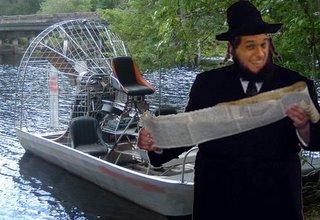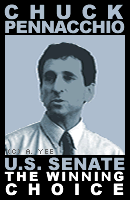The flow of election returns for the U.S. Senate race in Pennsylvania's Democratic primary preceded my emotional cascade. All of the day's jubilation and optimistic projections were at once crushed under the weight of Bob Casey's boundless endorsements and multimillion dollar war chest. Despite an army of grassroots supporters holding a fervent belief in his righteousness, Chuck
Pennacchio lost his bid for U.S. Senate, badly; Dr.
Pennacchio only received nine percent of the votes. After twelve hours on my feet at the polls in a chilling rain, myself, a once proud idealist, returned home a dejected cynic.
Fortunately, for my sake, my cynicism did not last. While Chuck
Pennacchio only received nine percent of the vote throughout the state, he captured a full third of the vote in Centre County, and won the Borough of State College by a healthy 16 point margin. Chuck
Pennacchio didn't win State College by spending lots of money or diverting most of his efforts here; Dr.
Pennacchio won because an organized band of passionate volunteers convinced the people of State College that he was the best candidate for Senate. If progressives can win in State College when the students have left for the summer, we can win anywhere. Barry Goldwater lost the 1964 Presidential election to Lyndon Johnson in a landslide, but it was in Goldwater's grassroots candidacy that the modern conservative movement coalesced. We progressives did not achieve our goals by defeating Bob Casey in this election; however, we created something far more valuable: an organized grassroots movement in Pennsylvania. Sometimes the greatest hope emerges from the most tragic of defeats.
Many
Pennacchio supporters refuse to vote for Bob Casey in the general election, and I will freely admit that I don't want to vote for him. For a progressive voter, Casey is wrong on many--but not all--issues (stem cells, the war, gay rights, abortion, separation of church and state, judicial appointments, gun control, executive power, and universal health care). However, he is right on one key issue: voting for Harry Reid as Senate Majority Leader. A Casey victory will bring the Democrats one member closer to majority control of the U.S. Senate. The benefits of Democratic control of the Senate will will far outweigh the
regressiveness brought to the body by Bob Casey. Imagine, if the Democrats controlled the Judiciary Committee? (It's highly unlikely that Bob Casey would be on this committee). Samuel
Alito's nomination would have never made it to the Senate floor. Nor would have the constitutional amendment banning gay marriage. A Democrat controlled Senate could push through legislation that would raise the minimum wage, roll back tax cuts for the rich, and allow the government to negotiate drug prices. It could investigate the
warentless NSA wiretapping and the intelligence failures run-up to the war in Iraq, whether or not Casey agreed to it. Although Casey will move the Democratic Party to the right, he will move our government to the left. While Casey is a social conservative, he is more liberal than Rick
Santorum, and defeating
Santorum will negate the influence of a powerful ultra-conservative. If the Democrats stand any change of regaining control in the Senate, we must win in Pennsylvania, which, unfortunately, means voting for Bob Casey.
No one should have to hold his nose to vote for a candidate, but politics are not games of pleasure, they are ones of strategy. Some will argue that the long-term harm to the party produced by Casey's election will outweigh the damage done by six more years of
Santorum--that Casey's election will further an "if you can't beat 'em join 'em" mentality among Democrats, that stymies the creation of a real opposition party. Unfortunately, for the sake of progressives, the Democratic party has already moved too far to the right, and Bob Casey's election will not change that fact. Whether it be supporting the bankruptcy bill, Hillary Clinton's cuddling up to Rupert Murdoch, or the 34 Democrats who voted to renew the USA PATRIOT act, the Democrats are not going to lurch rightward with Bob Casey in office; they are already there.
The only significant way for progressives to move the Democratic Party back to the left is by
becoming the Democratic Party. By uniting us, Chuck
Pennacchio's campaign has carried us a long way toward achieving that goal; but we must remain active in politics and shape and affect our local parties throughout the year--not just on election day. Those perched at the top of the Democratic hierarchy are supported by the roots of local politics that we must become. Go to your local Democratic functions, run for precinct chair, donate $50 to a candidate in whom you believe; do anything, but do it often. Through a concerted gradual effort we can become the change we want to see in the Democratic Party.



